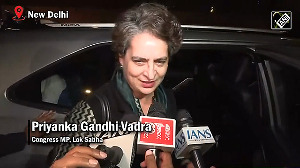Getting yourself on the merit list has its pluses and minuses. For Navneet Munot, who longed to start an investment firm of his own, getting his name on the top of the CA charts meant giving up his entrepreneurial dreams, as Mumbai-based investment firms queued up to enlist his services.
However, 13 years on, the chief investment officer (fixed income) of Birla Sunlife AMC does not regret his decision. During the period, he has had exposure to areas spanning asset classes such as fixed income, forex, equities and derivatives. Munot has put the opportunity to good use while tackling the sharp rise in interest rates during the last three years.
Interesting times
"The slowing down of the US economy (Fed taking a pause in rate hikes) and the commodity downturn (lower inflation) are supportive of the bond market," says Munot.
He, however, thinks that interest rates may remain rangebound because of the growth in money supply, credit, and government borrowings and the rise in inflation.
"The yield on the 10-year government paper is likely to stabilise in the 7.5-8 per cent band," he says. But how does he get a fix on interest rates?
From top to bottom
"Our fixed income decision-making process is a combination of the top-down and bottom-up approaches," says Munot.
The interest rate view depends on the macroeconomic outlook and fiscal and monetary policies, while the sector call involves consideration of the type of security to invest in, be it government papers, corporate bonds or asset-backed securities.
"A key ingredient of the top-down approach -- once the macro indicators are in place -- is to identify which part of the yield curve to enter," says Munot. The bottom-up side of the analysis includes taking credit calls on businesses to upgrade or downgrade them.
On the equities side (his portfolio includes hybrid funds), Munot looks at competitive advantage as a starting point of his bottom-up approach. Besides fundamentals, sound management, earnings visibility and, most importantly, a good price are the parameters he looks at.
Some of the sectors he is bullish on are alcoholic beverages and retailing (consumption story), banking (relative valuation) and agri-related sectors (revival of rural economy led by higher agricultural growth). With research playing a key role, which decisions have clicked for him?
Among Munot's successes is the call he took on the one-year corporate paper. For a major part of last year, interest rates had been on the rise and the fund was running low duration.
"In March this year, we took a large position in one-year money market instruments and rates fell by over 100 basis points by April to 7.5," he says. The fund was sitting on cash as it believed that a tightening liquidity situation would worsen in March.
Risk and returns
On the fixed income side, the rise in interest rates after 2003 has changed investors' appetite for various products. Munot gives an example: Birla Income Plus, a medium-term debt fund, which had over Rs 3,500 crore (Rs 35 billion) corpus in 2003, has it shrunk to Rs 225 crore (Rs 2.25 billion) now.
On the other hand, its liquid fund, the Birla Cash Plus, had assets of Rs 1,000 crore (Rs 10 billion) in 2003, which went up to over Rs 8,800 crore (Rs 88 billion) now. For the medium-term products, the fund reduced its holding period to less than one year to hedge rising rates.
"With active management, liquid funds could offer up to 6.5 per cent returns. They have neither a credit risk nor an interest rate risk," says Munot.
For investors who are ready to take extra risk, there are short-term funds that give around 7 per cent returns or income funds that yield up to 7.5 per cent returns.
Fund houses have proactively offered alternatives, to tackle interest rates volatility. He suggests floating-rate funds for investors who do not want to take high risk. Munot believes that credit derivatives, swaps and mortgage-backed securities will expand the market in a big way in the future.
Bookworm
Munot's interest in markets is quite apparent and it was unlikely that he would have opted for any other profession. "I breathe markets and am passionate about it. I feel proud to be a trustee of other people's money," says Munot, who manages various fixed and hybrid income schemes worth over Rs 12,000 crore (Rs 120 billion).
He is a voracious reader too, and is particularly fond of autobiographies. He also loves reading George Soros's books to get a look-in on the philosophy and trading secrets of the legendary investor. Reading from diverse streams, he says, keeps him intellectually aware and helps him make a deeper understanding of the human psyche.
When he polishes off his long association with the markets ten years from now, Munot would like to start his own not-for-profit asset management company that will involve managing monies of philanthropic organisations.






